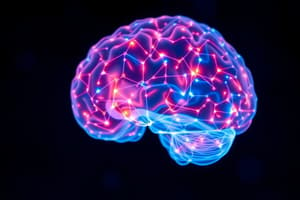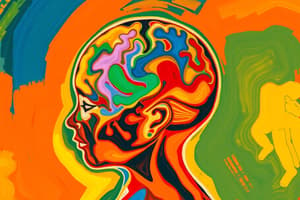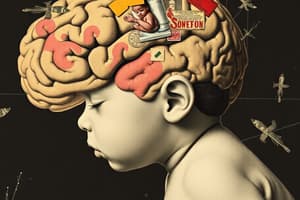Podcast
Questions and Answers
At which stage of Piaget's cognitive development do children begin to understand that objects exist independently of themselves?
At which stage of Piaget's cognitive development do children begin to understand that objects exist independently of themselves?
- Pre-operational stage
- Sensorimotor stage (correct)
- Formal operational stage
- Concrete operational stage
What cognitive limitation do children in the pre-operational stage exhibit according to Piaget's theory?
What cognitive limitation do children in the pre-operational stage exhibit according to Piaget's theory?
- Failure to perform systematic reasoning
- Inability to grasp abstract concepts
- Inability to understand egocentrism
- Failure to perceive changes in quantity and volume (correct)
What is one of the key characteristics of the formal operational stage?
What is one of the key characteristics of the formal operational stage?
- Children only solve tangible problems
- Children show a limited understanding of object permanence
- Children can think systematically and abstractly (correct)
- Children use egocentric reasoning
What cognitive skill is lacking in infants during the sensorimotor stage, leading to the A-not-B error?
What cognitive skill is lacking in infants during the sensorimotor stage, leading to the A-not-B error?
What does constructivism, as described by Piaget, emphasize about a child's learning process?
What does constructivism, as described by Piaget, emphasize about a child's learning process?
What is the primary focus of Vygotsky's theory of learning compared to Piaget's?
What is the primary focus of Vygotsky's theory of learning compared to Piaget's?
What does the zone of proximal development (ZPD) refer to?
What does the zone of proximal development (ZPD) refer to?
How did Vygotsky's view of infant cognitive abilities contrast with Piaget's perspective?
How did Vygotsky's view of infant cognitive abilities contrast with Piaget's perspective?
What is the concept of 'motionese' in the context of infant learning?
What is the concept of 'motionese' in the context of infant learning?
At what age do children typically begin to understand the concept of theory of mind?
At what age do children typically begin to understand the concept of theory of mind?
What is a key characteristic of brain development that occurs within the first two years of life?
What is a key characteristic of brain development that occurs within the first two years of life?
Which statement best describes teratogens?
Which statement best describes teratogens?
What impact can fetal alcohol spectrum disorders (FASD) have on individuals throughout their life?
What impact can fetal alcohol spectrum disorders (FASD) have on individuals throughout their life?
What does the concept of neural plasticity refer to in early development?
What does the concept of neural plasticity refer to in early development?
What is a significant outcome observed in infants exposed to air pollution during pregnancy?
What is a significant outcome observed in infants exposed to air pollution during pregnancy?
At what age do children typically begin to show an understanding of the action capabilities of different agents?
At what age do children typically begin to show an understanding of the action capabilities of different agents?
What does theory of mind allow children to understand about other people's beliefs?
What does theory of mind allow children to understand about other people's beliefs?
What is executive function primarily concerned with in children’s behavior?
What is executive function primarily concerned with in children’s behavior?
Which of the following best describes the violation of expectation task in relation to theory of mind?
Which of the following best describes the violation of expectation task in relation to theory of mind?
At what stage do children drastically improve their theory of mind, passing classic false belief tests?
At what stage do children drastically improve their theory of mind, passing classic false belief tests?
Flashcards
Developmental Psychology
Developmental Psychology
The study of how and why biological, physical, cognitive, emotional, and social abilities develop throughout childhood.
Teratogens
Teratogens
Substances that can cause atypical development in a fetus if exposed during pregnancy.
Fetal Alcohol Spectrum Disorders (FASD)
Fetal Alcohol Spectrum Disorders (FASD)
Developmental problems that can result from alcohol exposure during pregnancy, negatively impacting physical, mental, and behavioral development in children.
Myelination & Synaptogenesis in infants
Myelination & Synaptogenesis in infants
Signup and view all the flashcards
Neural Plasticity
Neural Plasticity
Signup and view all the flashcards
Object Permanence
Object Permanence
Signup and view all the flashcards
A-not-B Error
A-not-B Error
Signup and view all the flashcards
Egocentrism
Egocentrism
Signup and view all the flashcards
Conservation
Conservation
Signup and view all the flashcards
Operations
Operations
Signup and view all the flashcards
Social Constructivism
Social Constructivism
Signup and view all the flashcards
Zone of Proximal Development (ZPD)
Zone of Proximal Development (ZPD)
Signup and view all the flashcards
Social Referencing
Social Referencing
Signup and view all the flashcards
Theory of Mind
Theory of Mind
Signup and view all the flashcards
False Belief Task
False Belief Task
Signup and view all the flashcards
Executive Functions
Executive Functions
Signup and view all the flashcards
Violation of Expectation Task
Violation of Expectation Task
Signup and view all the flashcards
Social Cognition
Social Cognition
Signup and view all the flashcards
Study Notes
Developmental Psychology
- Explores how biological, physical, cognitive, emotional, and social abilities develop throughout childhood.
- Key debates include stability vs. change, continuity vs. discontinuity, nature vs. nurture, and critical vs. sensitive periods.
- Studying development helps understand adult minds, clinical conditions, and typical abilities.
Infant Development
- Human development begins in utero.
- Gestation period is roughly 38-40 weeks (9 months).
- Infant brains are similar in structure to adult brains but smaller (about a quarter the size).
- By 6 months, a baby's brain has reached 50% of its adult size.
- Neural structures aren't fully myelinated or connected at birth.
- Myelination and synaptogenesis occur until around age 2.
- Unused synapses are pruned throughout development.
- Neural plasticity diminishes with age.
Infant Development: Prenatal Influences
- Prenatal damage can affect infant brain development.
- Teratogens are substances that cause atypical development with prenatal exposure.
- Examples include air pollution, PVC elements, and alcohol.
- Fetal Alcohol Spectrum Disorders (FASD) lead to physical, mental, and behavioral impairments.
- FASD impacts manifest across different ages, from infancy to adulthood.
History of Developmental Psychology
- Industrial Revolution increased the demand for an educated workforce.
- Initial focus was on cognitive development for better education and learning.
- Later research expanded to emotional and social development, and adult development.
- Early researchers include John B. Watson, Charles Darwin, and Wilhelm Preyer.
- By 1880, there were 47 empirical studies on development in Europe and North America.
- Key figures of the 20th century: Piaget, Vygotsky, and Bowlby.
Piaget's Stages of Cognitive Development
- Piaget's theory describes children's cognitive development passing through stages.
- Stages: Sensorimotor (0-2 years), Preoperational (2-7 years), Concrete Operational (7-12 years), and Formal Operational (12 years-adulthood).
- Sensorimotor: Infants sense, move, but cognition is limited; Lack of object permanence is a key characteristic.
- A-not-B error: Infants persist in searching for objects in the first location they saw them, even when the object was moved.
- Preoperational: Egocentrism is present; Children have difficulty seeing things from other perspectives. (Three mountain task)
- Concrete Operational: Children can solve concrete problems; using operations to solve concrete problems, but abstract thinking is limited.
- Formal Operational: Children can think systematically and abstractly (scientific reasoning).
- Piaget viewed children as actively constructing their understanding of the world (Constructivism).
Vygotsky's Social Constructivism
- Vygotsky believed social interaction guides cognitive development.
- Zone of Proximal Development (ZPD): The difference between what a child can do independently and with guidance.
- Social Referencing is crucial, children use social cues to guide their actions.
Emerging Cognitive Abilities in Infancy
- Infants mimic facial and motor gestures (innate or early developed ability).
- Motionese is used by adults to help infants process information.
- Object permanence emerges earlier than Piaget proposed.
- Infants show understanding of the contact principle.
- Infants display causal reasoning.
Theory of Mind
- Theory of Mind (ToM): Understanding that others have their own desires, beliefs, and mental states.
- False Belief Tasks demonstrate this understanding (e.g., Angela and the chocolate).
- Implicit measures (e.g., looking time tasks) suggest ToM develops earlier than explicit tasks.
Executive Functions
- Executive Functions: Cognitive abilities enabling voluntary actions.
- Three components: Inhibition, Working Memory, Shifting.
- Examples: Marshmallow task; A-not-B error.
- Executive functions are tested in a "hot" (emotional response involved) or "cool" (no emotional response) manner.
Autism Spectrum Disorder (ASD)
- ASD involves impairments in social skills, communication, and restricted/repetitive behaviors.
- Children with ASD often struggle with theory of mind, executive functions, and imitation.
- Mirror neurons are hypothesized as potentially contributing factors.
- Eye-tracking studies indicate limitations in using gaze direction to predict intentions in ASD.
Studying That Suits You
Use AI to generate personalized quizzes and flashcards to suit your learning preferences.
Description
This quiz delves into the stages of infant development from prenatal influences to the growth and changes in brain structure. It addresses key concepts like myelination, synaptogenesis, and the impact of teratogens. Understanding these aspects is vital for grasping the nuances of human growth in early childhood.




